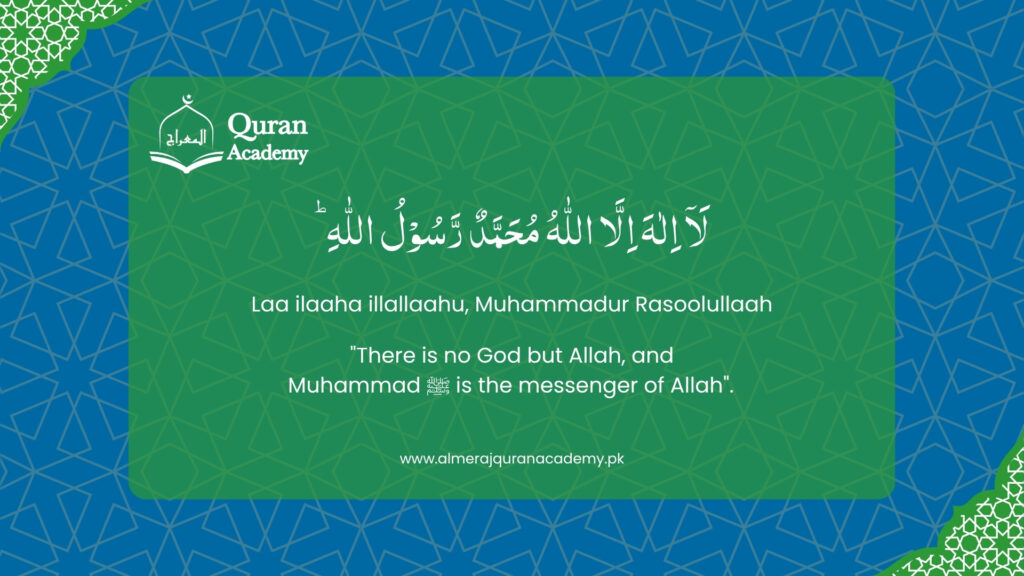First Kalma
Kalma Tayyibah
The First Kalima, known as Kalima Tayyibah (كَلِمَاتْ اَلطَّيِّبَة), carries the meaning of purity. It is one of the most well-known phrases among Muslims and is memorized and recited regularly. This Kalima forms the core of Islamic belief and is part of the foundation of the religion, as it reflects the primary declaration of faith and is one of Islam’s five pillars.
Tawheed, the first pillar of Islam, is the declaration that there is no deity but Allah سُبْحَانَهُ وَتَعَالَى and that Muhammad ﷺ is His final Messenger. The First Kalima represents this central belief, which is why it holds such great importance in a Muslim’s life. It is frequently memorized and repeated by Muslims all over the world as a reminder of their faith.
Additionally, the Kalima Tayyibah serves as the formal expression of accepting Islam. When someone converts to Islam, they recite this Kalima — also referred to as the Shahadah — as a testimony of their faith and their entrance into the fold of Islam.
Kalma Tayyibah
La ilaha illallahu muhammadur rasulullah
“There is no God, but Allah and Muhammad (SAW) is His last Messenger.”
ؕلَآ اِلٰهَ اِلَّا اللّٰهُ مُحَمَّدٌ رَّسُوْلُ اللّٰهِ

“Kalima” is an Arabic term meaning “a phrase.” In Muslim communities—particularly in South Asia—six Kalimas are commonly taught to children from an early age. These Kalimas represent key Islamic beliefs and are memorized as part of one’s faith. They are especially widespread in countries like Pakistan, India, and Bangladesh, more so than in other regions.
The Significance of Kalima Tayyibah – First Kalima
The first Kalima, known as Kalima-e-Tayyibah, forms the foundation of Islamic belief. It consists of two essential parts:
The first part affirms the belief that only Allah سُبْحَانَهُ وَتَعَالَى is worthy of worship, emphasizing the concept of Tawheed (monotheism), which is central to Islam.
The second part declares that Prophet Muhammad ﷺ is the Messenger—and the final Messenger—of Allah. Scholars agree that this affirms the belief in his finality as a prophet.
Together, these parts make up the essential declaration of faith in Islam. When someone accepts Islam, this is the very first phrase they recite, highlighting its foundational significance.
Reciting Kalima Tayyibah
There are no restrictions on how often or when one can recite the Kalima Tayyibah. As the first pillar of Islam, it is among the most frequently repeated phrases by Muslims. It can be recited anytime and anywhere, without any set limit.
No Limit on Recitation of Kalma Tayyibah
There is no specific number of times it must be recited daily. It can be read once, or hundreds of times, depending on one’s devotion and time.
Making Kalma Tayyibah a Part of Daily Life
Integrating Kalima Tayyibah into daily routines brings numerous spiritual benefits. However, it is important to always recite the complete Kalima and not just a portion of it. Regular recitation:
Reinforces the belief in the oneness of Allah
Reminds us of the Prophethood of Muhammad ﷺ
Distinguishes Muslims from non-believers
Strengthens Islamic faith and monotheism
Helps in living a righteous life according to Islamic teachings
Benefits of the Kalima Tayyibah Based on the Quran and Hadith
Though the full Kalima is not present as one phrase in the Quran, its components appear separately:
“لَا إِلٰهَ إِلَّا ٱللَّٰهُ” (There is no deity except Allah) appears in multiple verses
“مُحَمَّدٌ رَسُولُ ٱللَّٰهِ” (Muhammad is the Messenger of Allah) is mentioned in Surah Al-Fath, verse 29
Islamic teachings in both Quran and Hadith emphasize these beliefs as core components of faith. Several Hadiths underline the significance of the Kalima:
This Kalima Tayyibah is a part of the five pillars of Islam; in fact, the first pillar of Islam, as narrated in the Hadith:
Translation – Narrated Ibn ‘Umar: that the Messenger of Allah (ﷺ) said:
“Islam is based upon five: the testimony of La Ilaha Illallah, and that Muhammad is the Messenger of Allah, the establishment of the Salat, giving the Zakat, fasting (the month of) Ramadan, and performing Hajj to the House.
[Trimidhi 2609]
Translation – It was narrated that Abu Hurairah that the Messenger of Allah (ﷺ) said:
“Urge your dying ones to say La ilaha illallah.”
[Sunan Ibn Majah 1444]
Translation – Abu Dharr reported:
I came to the Apostle (may peace be upon him ) and he was asleep with a white mantle over him. I again came, he was still asleep, I came again and he had awakened. I sat by his side and (the Holy Prophet) observed: There is none among the bondsmen who affirmed his faith in La illaha ill-Allah there is no God but Allah) and died in this state and did not enter Paradise. I (Abu Dharr) said: Even if he committed adultery and theft? He (the Holy Prophet) replied: (Yes) even though he committed adultery and theft. I (again said): Even if he committed adultery and theft? He replied: (Yes) even though he committed adultery and theft. (The Holy Prophet repeated it three times) and said for the fourth time: In defiance of Abu Dharr. Abu Dharr then went out and he repeated (these words): In defiance of Abu Dharr.
[Sahih Muslim 94b]
Translation – It was narrated from Mu’adh bin Jabal that the : Messenger of Allah(ﷺ) said:
“There is no soul that died bearing witness to La ilaha illallah, and that I am the Messenger of Allah, from the heart with certainity, but Allah will forgive it.”
[Ibn Majah 3796]
Kalima Tayyaba is more than just a phrase—it is the essence of Islamic belief. Muslims should make it a daily habit, repeating it with sincerity, as it serves as a reminder of their core faith and strengthens their relationship with Allah سُبْحَانَهُ وَتَعَالَى.

